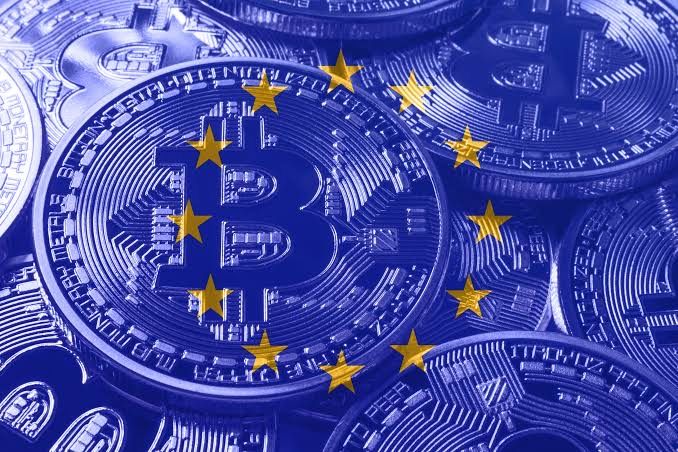European Union Pioneers Sweeping Cryptocurrency Regulations: A Step Towards Global Regulatory Alignment
Today, the European Union has made a significant stride in the global financial sector by approving a comprehensive set of cryptocurrency regulations. These robust rules—establishing liability for providers in the event of loss of investors' crypto assets—will be enforced in 2024 across all 27 EU member states.

Today, the European Union has made a significant stride in the global financial sector by approving a comprehensive set of cryptocurrency regulations. These robust rules—establishing liability for providers in the event of loss of investors' crypto assets—will be enforced in 2024 across all 27 EU member states.
Elisabeth Svantesson, Sweden's Minister of Finance, expressed her contentment over the development, stating, "Today, we are delivering on our promise to start regulating the crypto-assets sector." Svantesson emphasized the urgency of implementing these regulations to better protect European investors and prevent the misuse of the crypto industry for money laundering and financing terrorism.
The legislation was prompted, in part, by the recent collapse of FTX, previously one of the world's largest cryptocurrency exchanges. The exchange's implosion led to an estimated $8 billion in customer losses, as reported by the United States Commodity Futures Trading Commission.
Fostering Trust and Transparency
The EU's new regulations aim to foster trust and transparency in crypto transactions. They ensure that crypto assets can be traced in the same way as traditional money transfers, and they empower authorities to block suspicious transactions. The rules also provide enhanced consumer protection and safeguards against market manipulation and financial crime.
These regulations do not apply to person-to-person transfers but do cover transactions above 1,000 euros from self-hosted wallets whenever they connect to wallets hosted by crypto-assets service providers.
Moreover, to tackle the high carbon footprint of cryptocurrencies, the new regulations require crypto providers to disclose their energy consumption. All providers will need a license to issue, trade, and safeguard crypto assets, tokenized assets, and stablecoins. Any non-compliant entity will be documented in a European Securities and Markets Authority public registry to prevent money laundering, terrorist financing, and other criminal risks.
"These regulatory measures are designed to protect investors, preserve financial stability, whilst promoting innovation and enhancing the attractiveness of the crypto-asset sector," the press release stated.
A Welcome Change for Many, but Not All
Interestingly, some stakeholders in the crypto industry have recently advocated for regulations, claiming that clearer rules will help spur growth. However, not all crypto providers are in agreement with EU lawmakers about the necessity of regulation.
Mairead McGuinness, the European Commissioner for Financial Services, shed light on this dichotomy, stating, "Some of those who were involved in crypto from the very outset, were doing it because they didn't want to be part of the regulated, managed system. That's a very dangerous path."
Global Influence and the Road Ahead
This development does not mark the end of the EU's mission to regulate the cryptocurrency market. McGuinness has previously stressed the need for a globally coordinated approach to regulating cryptocurrency.
The EU's latest regulatory progress could be seen as the first step in its attempt to collaborate with the US and "lead the way" to a "shared international approach to regulating crypto," as McGuinness suggested.
In an op-ed, McGuinness outlined a potential global agreement on crypto, emphasizing four important steps all stakeholders should take to align with the EU's regulations. Her primary goal is to ensure that "no product remains unregulated." Once all cryptocurrencies are regulated, countries should then "collect and exchange information" and agree to protect all retail investors.
As the EU continues to lead in establishing comprehensive crypto rules, the US and Britain are reportedly trying to catch up. Britain has yet to establish a timeline for introducing its phased approach to regulating crypto assets, and the US is still unclear on how it wants to implement oversight.
If a global agreement is ever reached based on the EU's regulatory framework, McGuinness envisions a future where everyone around the world can "make payments cheaper, faster, and safer." This could potentially unlock untold benefits and free up the billions of euros and dollars currently tied up in covering credit or settlement risk in the existing financial system.
Furthermore, McGuinness emphasized the need to "fully integrate environmental considerations" into a global agreement to prevent climate harm. This would contribute to making the blockchain more sustainable as the cryptocurrency ecosystem expands to not only include decentralized exchanges but also government-backed central bank digital currencies.
This groundbreaking move by the EU could set the stage for a transformative era in global finance. While the implications of these regulations are yet to be fully realized, they indeed represent a significant shift in attitude towards the cryptocurrency industry.
However, the path to a globally harmonized approach to cryptocurrency regulation remains fraught with challenges. The diverse interests of different nations, the rapid evolution of crypto technologies, and the inherent anarchy of the blockchain could all pose significant hurdles.
Nevertheless, the EU's proactive approach may well serve as a blueprint for other nations grappling with the challenge of regulating the dynamic and increasingly influential cryptocurrency industry. This development could be the beginning of a more secure, transparent, and sustainable future for the world of digital currencies.
While the EU's regulations may not be perfect, they represent a significant step in acknowledging and addressing the realities of a financial landscape that is increasingly digital and decentralized. As McGuinness emphasized, the potential of such regulatory moves to make "payments cheaper, faster, and safer" could bring about significant benefits for consumers and businesses alike, while also addressing important risks and concerns.
As the 2024 implementation date approaches, it will be crucial to see how these new regulations are received by the crypto industry, how they influence regulatory approaches in other jurisdictions, and how they contribute to the ongoing evolution of the global financial system.
In the final analysis, the EU's pioneering work in crypto regulation could set a new standard for how digital currencies are treated on the global stage, providing a model for other nations to follow and potentially ushering in a new era of responsible and sustainable crypto finance.




